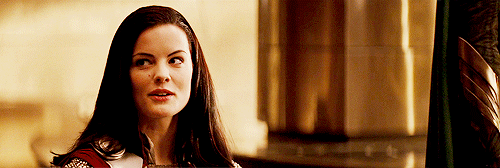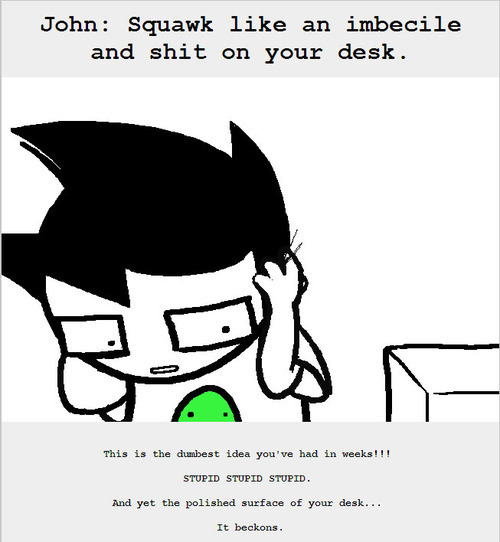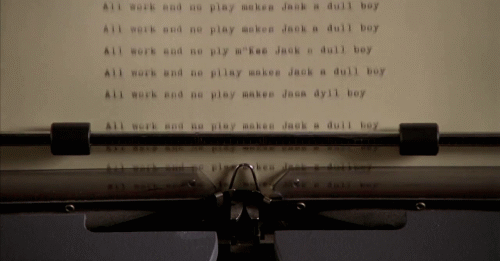Hey I want to genuinely ask why don’t you make your own story/game with the design of how you want females to be represented? I know what you have to say about it in your Rhetroic Bingo but there are ways to get around that; Like making a webcomic of said story to gain fans then make a kickstarter for a game or book I mean it worked for Andrew Hussie’s Homestuck series, Or you could gather a group of like minded individuals to collaborate on a game/movie/comic.
Actually we’re both working on our own projects (they’re at a stage of completion where we’re comfortable sharing, and neither are the like minded people we’re working with (so there will be no further details forthcoming at this time).
Also, believe it or not: Some of the people involved in related blogs actually work in industries such as video games.
Saying that it “worked for Andrew Hussie’s Homestuck series” is as absurd, it’s like suggesting that someone’s who broke should just become a millionaire by building a web site like Google (it worked for Larry Page and Sergey Brin!)
Homestuck is a particularly bad example because it:
- Didn’t really challenge the status quo at all, it was just a new absurdist comic that wanted to tell a story and entertain
- Has a large and very enthusiastic fanbase, but has more or less no influence outside of that fanbase. It’s very successful for a web comic, but that success doesn’t mean it’s influential in the grand scheme of things (or even in web comics)
- Employs an economical style that works fine for the stories in Homestuck but is not necessarily even faintly compatible with other styles and stories.
Making a production that showcases women in sensible armor would pretty much require a higher standard of visual quality than something that’s intended to look like a scribble done in MS Paint. So even with a web comic at a lot of hours in image creation.
More accessible and larger markets (which means more competition) products like animated features/movies/etc require even more effort and expertise. Video games would require more skills and time again.
That’s not to say things like Kickstarter and Steam’s Greenlit aren’t fantastic and making the market more accessible but it’s insulting to creators of these products to downplay the work involved and pretend just anyone can do it (particularly with their other responsibilities and how much work is involved).
Even if Ozzie and I did somehow stumble across the time, money and connections to make a modest game (since video games are currently the biggest market) – say on par with Gone Home, here’s what we could look forward to:
- Sales would be a small fraction of those by mainstream publishers – even a lambasted product like Kingdoms of Amalur: Reckoning gets more sales (and hence market influence) than a critically acclaimed indy production
- If the game doesn’t do well, for any reason – there will be a general backlash saying that it’s proof that the public doesn’t want well armored heroines
- If the game does do well, for any reason – there will be a general backlash from people claiming that it’s only got sales due to political reasons and not because of the game (for more information, read the reviews on Gone Home’s Steam Store page – for extra laughs compare them to the reviews on The Stanley Parable a game that employs almost identical mechanics but doesn’t challenge people’s perceptions of the world around them per se)
- While it may provide some influence in mainstream gaming, it is likely that the industry would in general mostly overlook. Lots of people want to copy Minecraft – but almost nobody talks about its gender ambiguity.
I mean we already have big names in industry like David Gaider promoting the importance of inclusion, Mark Rubin – the executive producer of Call of Duty (the iconic game of brodudes) recently announced they’ll be including female playable characters to recognize the female fanbase they already have around the same time that Ubisoft announced that making female characters in their next Assassin’s Creed game would be too much work.
The idea that an independent production is somehow going to overpower the influence of the mainstream media is, frankly, ridiculous (unless you’re Batman). None of that is to say there aren’t things like games or artworks out there that are made for political reasons or with such goals – but they’re made by people who want to make the things.
History has already shown that if you make a web comic just because you want to make lots of money off it – you’re going to be disappointed. Likewise if you make a web comic, animation or game just because you want the world to change their perceptions of other people. Usually even political projects are less about expecting to change people, and more about the need to express something important.
So to summarize the main points:
1. Not everyone who is critical of a market should be expected to produce for that market. Every modern marketplace needs more customers than suppliers so it makes sense to leave the production up to people with the motivation and skills to do so.
2. If 50% of the population can see themselves well represented by going to, say, a game store, but the other 50% have to spend years building a game for themselves – that is not equality.
Criticism in the marketplace is important, it leads to more pressure on the experts to make better products and refine their priorities.
– wincenworks
This week throwback: an in-depth explanation of why “If you don’t like it, go make your own!” argument is one big fallacy and an insult to all hard work that goes into creating media.
All of the above are the reasons why it is warranted its own spot on the Rhetoric Bingo.

Feel free to share this post with anyone who insists that people should start making their own games/movies/comics/whatever instead of “whining” about having no representation in media.
~Ozzie



